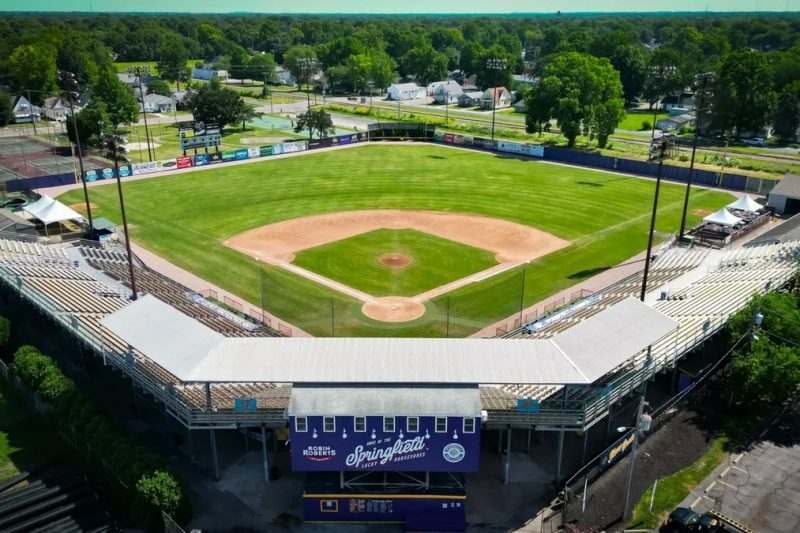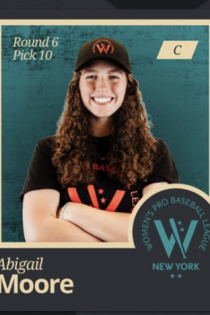A League of Their Own, Once Again
By Destiny Lewis
Reporting Texas

Robin Roberts Stadium will serve as the home for the new Women’s Pro Baseball League. WPBL
At 4 years old, Abby Moore picked up a baseball bat for the first time in her Arlington, Texas, neighborhood. She was small, fearless and instantly hooked.
As she grew, Moore never drifted away from the sport the way many girls her age did. While classmates moved to softball, she stayed on baseball rosters filled with boys, learning how to block tougher pitches as a catcher, adjust to faster arms and carry herself with the confidence of someone who knew she belonged. Each season sharpened her skills — and thickened her skin.
Weekends meant Little League games with her friends. Afternoons meant throwing in the backyard. By the time she joined select baseball in fifth grade, she realized something important: She wasn’t just keeping up with the boys; she was competing with them.
“That was a cool moment where I thought, ‘Oh wow, I can take this far,’” Moore said.
For most of her life, “far” was a blurry concept. Girls who loved baseball rarely had anywhere to go beyond high school. College baseball scholarships overwhelmingly favor men’s programs, while women get pushed toward softball — not because of preference, but because softball is where the opportunities are. Professional baseball for women? It hasn’t existed in the United States since 1954.
Until now. In 2026, for the first time in more than 70 years, women in the United States will have a professional baseball league built for them.
The Women’s Pro Baseball League — co-founded by Justine Siegal and Keith Stein — is preparing for its historic launch next August with teams in Los Angeles, New York, Boston and San Francisco. The league held its first-ever player draft Thursday, streamed live on Instagram, TikTok and YouTube.
More than 100 draft-eligible players from 10 countries were in contention, along with thousands of young girls who suddenly have a future in a sport that once shut them out.
Moore, 18, had already built a résumé that positioned her as one of the youngest serious prospects in the inaugural draft.
In the sixth round, with the 110th overall pick, the New York franchise drafted Moore, one of the few high school athletes to earn a spot in the league’s inaugural class.

Abigail Moore is one of the few high school students to be part of the inaugural draft of the Women’s Pro Baseball League
“I couldn’t believe it at first,” Moore said. “I’m overwhelmingly grateful for the opportunity and excited to prove myself.”
Before her name ever appeared on a draft board, Moore had already made history in Arlington. After years of competing alongside boys in Little League and select ball, she walked into high school tryouts and earned a spot as the first girl in school history to put on an Arlington High baseball uniform. Playing catcher and outfield, she quickly became known not for being the only girl on the field, but for her arm strength, toughness and sharp instincts behind the plate.
Moore wasn’t the only player with Texas ties to hear her name called in Thursday’s draft. With the very next pick, No. 111, Los Angeles selected Celicia Wilken, a 33-year-old first baseman from Austin whose road back to baseball has made her a standout in women’s leagues. After returning to the sport now as an adult through a Dallas men’s league and earning All-Star honors, Wilken went on to win tournaments with the New England Red Sox women’s team and a 35+ World Series with the Yeti Reds.
To anchor this new era, the WPBL announced that all games for the 2026 inaugural season will be played at Robin Roberts Stadium in Springfield, Illinois — even though the league’s four franchises are named for Los Angeles, San Francisco, New York and Boston. The WPBL intentionally chose a single, neutral site for the first season to streamline operations, centralize travel, and ensure consistent facilities as the league establishes itself. Springfield’s location between the coasts, its rich baseball history, and its stadium exclusivity made it the league’s strategic starting point before teams begin hosting games in their home markets in future seasons.
Golden Rule Entertainment, the operator of the stadium, will manage all WPBL baseball operations and launch the WPBL Developmental League in 2027, creating the first direct pipeline from youth baseball to professional women’s baseball in modern history.
“When the decision was made to play the 2026 season at a neutral venue, we wanted a central location,” said Stein, WPBL co-founder and longtime baseball executive. “Robin Roberts Stadium provides the exclusivity and experience we wanted for our players.”
Stein, who serves as CEO of the Toronto Maple Leafs baseball team, was the original architect behind the idea for a modern women’s professional league and invited Siegal to join him in building it.
For athletes like Moore, that pipeline is more than organizational design. It’s hope.
Moore’s journey through baseball mirrors the experience of countless girls who refused to “switch sports” even when the system made it nearly impossible to stay.
At Arlington High School, she was welcomed onto the baseball team by a head coach who judged talent, not gender.
But during her sophomore year, an ACL tear during basketball jeopardized everything. Doctors weren’t sure she would ever catch again.
“Learning to trust my knee again — that was the hardest part,” she said. “It taught me not to doubt myself.”
Through a neighbor she met Gloria McCloskey Rogers, a former Rockford Peach from the All-American Girls Professional Baseball League — the real-life league that inspired the iconic film “A League of Their Own.” Rogers connected her with national team catcher Anna Kimbrell, who helped Moore earn an invitation to the All-American Women’s Baseball Classic in Durham.
It was her first time playing baseball with an all-women’s roster.
“It was the coolest opportunity ever,” she said. “Being surrounded by women who love the game just as much as I do — that was special.”
Until WPBL’s announcement, girls like Moore could play baseball — but almost always on boys’ teams, club teams, or sporadic women’s tournaments. The idea of a professional career was distant, hypothetical or archival.
Now, there is a clear pipeline with the WPBL’s inaugural season followed by the WPBL Developmental League.
When Moore imagines what this league means, she thinks of younger girls who will no longer have to make the choices she did — switching to softball in high school for scholarships, explaining her presence on boys’ teams, constantly proving she belonged.
“This league could change everything for girls who love baseball,” she said.
Moore is still a senior in high school, balancing varsity softball, tournaments with her all-girls baseball team, college plans and her future with the New York franchise that drafted her.
She isn’t sure where baseball will take her, but for the first time, she knows the path doesn’t dead-end.
“Girls belong on the field too,” she said. “And now we finally have somewhere to go.”